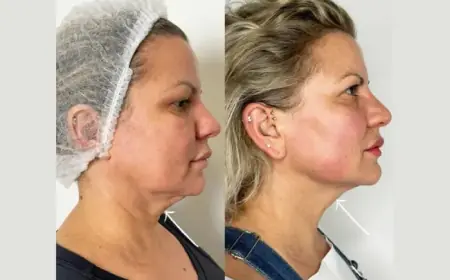Dry vs. Dehydrated Skin: Identifying Your True Skin Needs.
Get relief from dry, itchy skin in Islamabad. Discover effective treatments & expert dermatologists to restore your skin's health and comfort.

If your skin feels tight, flaky, or dull, you might immediately assume it’s just dry, but what if it’s actually dehydrated? While the symptoms can appear similar, dry skin and dehydrated skin are not the same, and treating them as such can make a world of difference. Understanding the distinction between the two is key to choosing the right products and professional help, especially if you're looking for a tailored Dry Skin Treatment in Islamabad to suit your needs.
Whether you're dealing with naturally dry skin or your skin is just thirsty for moisture, identifying your true skin concern is the first step toward healthier, more radiant skin.
Understanding the Basics: What’s the Difference?
Dry Skin: A Skin Type
Dry skin is a skin type, just like oily, combination, or sensitive skin. It’s typically caused by a lack of oil (sebum) production. People with dry skin often experience:
-
Flakiness or rough patches
-
A feeling of tightness even after moisturizing
-
Itching or irritation
-
A dull, uneven texture
-
More prominent fine lines and sensitivity to weather changes
Dry skin can be genetic or hormonal, and it often worsens with age or during colder months. Since this is a structural condition of the skin, it requires long-term skincare habits and possibly clinical treatments to maintain moisture balance.
Dehydrated Skin: A Skin Condition
Dehydrated skin, on the other hand, is a condition that any skin type can experience, even oily or acne-prone skin. It results from a lack of water in the skin, not oil. Common signs of dehydrated skin include:
-
Dullness and loss of radiance
-
A tight feeling without visible dryness
-
Temporary creasing or exaggerated fine lines
-
Increased sensitivity or redness
-
An oily yet flaky appearance
Dehydration is often caused by external factors like weather, diet, air conditioning, harsh skincare products, or not drinking enough water.
Why It Matters: The Risk of Misdiagnosis
Misidentifying dehydrated skin as dry skin (or vice versa) leads to inappropriate product use. For instance:
-
Using heavy creams meant for dry skin on dehydrated oily skin may clog pores and trigger breakouts.
-
Using lightweight hydrating products on dry skin might offer short-term relief but fail to rebuild the skin barrier long-term.
Understanding whether your skin needs water or oil helps avoid the skincare trap of overcompensating, which often does more harm than good.
Identifying Your Skin Type at Home
Still not sure which one you're dealing with? Here’s a simple test:
-
Cleanse your face with a gentle, non-stripping cleanser.
-
Leave it bare—no toner, no serum, no moisturizer—for about an hour.
-
Observe your skin:
-
If it feels tight and looks flaky, you likely have dry skin.
-
If it feels tight but looks shiny or oily in some areas, it's probably dehydrated.
-
Of course, a professional consultation can give you a more accurate diagnosis, especially if your symptoms overlap.
Causes of Dry Skin vs. Dehydrated Skin
| Factors | Dry Skin | Dehydrated Skin |
|---|---|---|
| Genetics | ✔️ | ❌ |
| Weather (cold, dry climates) | ✔️ | ✔️ |
| Harsh cleansers & soaps | ✔️ | ✔️ |
| Lack of oil | ✔️ | ❌ |
| Lack of water | ❌ | ✔️ |
| Aging | ✔️ | ✔️ |
| Diet, alcohol, caffeine | ❌ | ✔️ |
This table highlights how overlapping external triggers can make it even harder to distinguish between the two—another reason why targeted treatment is crucial.
How to Treat Each: Tailored Solutions for Lasting Results
For Dry Skin:
To combat dry skin effectively, you’ll want to focus on nourishing and strengthening the skin’s lipid barrier.
Key ingredients to look for:
-
Ceramides
-
Squalane
-
Shea Butter
-
Hyaluronic Acid (paired with occlusives to seal it in)
-
Fatty acids and oils like jojoba or almond oil
Pro Tip: Limit hot showers and exfoliation, as they can strip essential oils from your skin.
Clinical Treatments for Dry Skin:
In Islamabad, advanced skin clinics offer targeted procedures such as hydrating facials, lipid barrier repair treatments, and therapeutic moisturization protocols. These are ideal for those struggling with persistent dryness despite using skincare products.
If you’re seeking expert guidance and custom treatment options, SKN Cosmetics offers specialized Dry Skin Treatment in Islamabad tailored to your skin type and severity.
For Dehydrated Skin:
Dehydrated skin requires deep water replenishment and attention to external lifestyle factors.
Key tips and ingredients:
-
Drink plenty of water daily
-
Avoid caffeine and alcohol (they’re dehydrating)
-
Use humectants like glycerin or hyaluronic acid
-
Incorporate hydrating toners or essences
-
Sleep with a humidifier if you're in a dry climate
Best Practices:
-
Avoid over-exfoliating or using too many active ingredients like acids or retinoids, as these can further strip moisture.
-
Always seal in hydrating products with a lightweight moisturizer, even if you have oily skin.
When to Seek Professional Help
While over-the-counter products may help in mild cases, chronic dryness or dehydration often requires professional intervention. If you’ve tried everything and your skin still feels uncomfortable, flaky, or tight, it's time to consult a dermatologist or skin specialist.
At SKN Cosmetic Clinic in Islamabad, you’ll receive a full skin assessment and access to advanced treatments that go beyond drugstore skincare. Whether your skin needs deep hydration, oil replenishment, or both, their experienced dermatologists will design a personalized care plan that actually works.
Final Thoughts
Dry and dehydrated skin may look and feel similar, but they require completely different treatments. The secret to solving your skin troubles is identifying what’s truly missing—oil or water—and treating the root cause accordingly. Whether your skin is dry by nature or dehydrated due to the environment or lifestyle, there are effective solutions available.
What's Your Reaction?
 Like
0
Like
0
 Dislike
0
Dislike
0
 Love
0
Love
0
 Funny
0
Funny
0
 Angry
0
Angry
0
 Sad
0
Sad
0
 Wow
0
Wow
0


















































